|
Company
62-185
U.S. Navy Recruit Training Center
San Diego, CA
March 1962 - May 1962

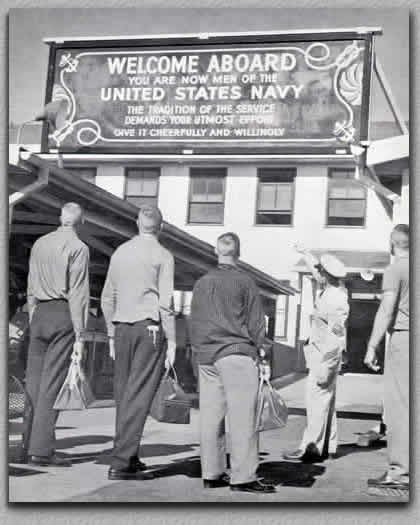
To view a short flash movie that I made on what recruit training was like at RTC San Diego around 1962, click on the below graphic.

Welcome
to the U.S. Navy. . . .
Everything
was going pretty well, until we arrived inside the U.S. Navy Recruit
Depot in San Diego, CA. I was in the front seat on the old Navy
bus (after all I was placed in charge of the group), kicked back,
with my feet up on the chrome railing. When the bus stopped and
the doors opened, I heard someone screaming, cussing and hollering
at all of us (calling us lower than life human excrement and other
expletives) to get off the bus pronto! Being the wise ass, that
I was at the time, I had to stick my head out the door and say "are
you talking to me?" Well, as you might guess, the situation
went downhill rapidly after that point. This hand reached in the
bus and yanked me over the railing and I landed in a heap on the
ground. Man, I didn't know someone could cuss and yell that much,
and so close to one's face! Well for that, I got to sleep on a hard
wood stencil bench that first night. Welcome to the U.S. Navy!

Boot
Camp only 9-weeks long? . . . .
We
were stripped of our civilian clothes (donating them to charity),
issued uniforms (which reeked from moth balls), stripped of all
our hair (in a 20-30 second haircut that if you failed to warn the
barber of any moles, you lost them), and given so many shots that
I thought no disease known to man would affect me. Then, we moved
and settled into our new barracks across the slough at Camp Nimitz.
When signing up, I was initially told that boot camp was only 9
weeks in duration, but they neglected to tell me that your time
in Camp Nimitz doesn't count towards the 9 weeks. And, we spent
3-1/2 weeks in Camp Nimitz!
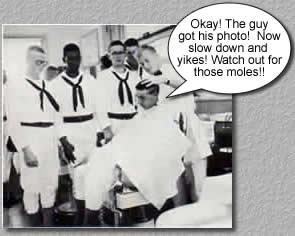
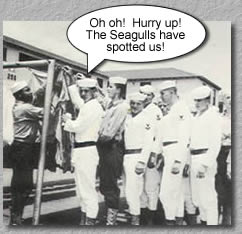
Stuff
we learned . . . .
We
learned how to scrub our uniforms by hand outside on concrete wash
tables (then watch the seagulls crap on them after we hung them
on the line), how to march in deep sand (since we couldn't do anything
right), how to fold clothes and make a bunk up (over and over again),
how to properly shave and shower, how to get up at 3 am in the morning,
and how to sleep standing up (while in formation waiting for chow).
We learned the 9-count/16-count manual, or one of those damn numbers,
with our pieces (rifle) until we could do it in unison in our sleep.
We were bussed out to Camp Elliot for fire-arm training, which I
did well in - I had done a lot of deer hunting before enlisting.
After undergoing 3-1/2 weeks of this conditioning, we finally moved
across the channel to Camp Decatur. Now, we could start counting
the days until the 9-weeks were up.
Webmaster Note: I get a lot of guestbook entries, and emails questioning my 12-plus weeks in bootcamp. I went into Bootcamp on March 2, and left in the last week of May...so you figure it out. We were not disciplined or set back, and our 9-week Bootcamp did not officially start until we moved across the bridge to Camp Decatur on, or about the last week of March. That's my story and I'm sticking to it.
Minor
discipline problems . . . .
I
did have a few minor discipline problems. I thought I could
smoke when I wanted and for that I got to smoke a whole pack of
cigarettes, all at once, with a trash can over my head! Then, once
I thought I could lean against the clothes line post while on watch
(who in the hell was going to steal them anyway?). I got to do jumping
jacks until I passed out, for that lack of discretion. Then, one
night standing barracks watch, being about half asleep, I got the
begeebies scared out of me when this booming voice said "what
does it take to get you moving, a stick of dynamite up your ass!"
I got lots of watch standing practice after that.
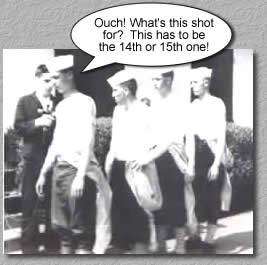 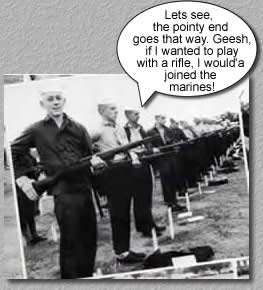
Mess
cooking . . . .
On
the week our company was scheduled for galley duties, I came down
with a bad cold. Therefore, I couldn't be around food. I ended up
being assigned to cleaning one of the senior officer's office, during
that week (a somewhat easier job, although it wasn't any fun performing
the task with a bad cold). Later on in my career, I once again missed
mess-cooking duties (made 3rd Class Petty Officer just before I
was scheduled to go). Fortunately, I never did have to mess-cook
through-out my career.
They
say Boot Camp wasn't bad . . . .
Throughout
my 22-year career, many of my shipmates recalled their boot camp
days and said "they weren't that bad." Well, I'm here
to tell you that I hated just about every minute of it. Being the
wise-ass kid that I was at the time and if it wasn't for the fact
that I would have to face my old man later, I believe that I could
have scaled that fence in a heartbeat. Our company commander was
one mean S.O.B., and if I saw him today in a cross walk, I could
be tempted still to make a hood ornament out of him! That man could
stand flat-footed and kick you right upside the head! Having said
all that, bootcamp did take some of the cockiness out of me and
taught me some humility and discipline - something today's youth
could use. Not to mention, I also left bootcamp in the best physical
condition of my life. Later, a couple old crusty Boatswain Mates
(at my first duty station) took more of the cockiness out of me
- put some knots on my head on a few occasions. Eventually, I got
the message.
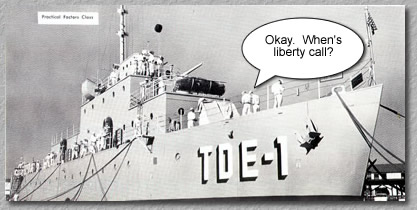
The
best Company . . . .
Our
company turned out to be the best company, in our brigade. Our company
commander had a reputation for always having the number one company.
We won all the flags, except one, the academic flag (which we lost
by a nose and missed an opportunity to win the overall Meatball
Flag). We won all the weekly competition flags, and for this we
were rewarded with time off and picnics at the Mission Gorge Navy
Recreation facility.
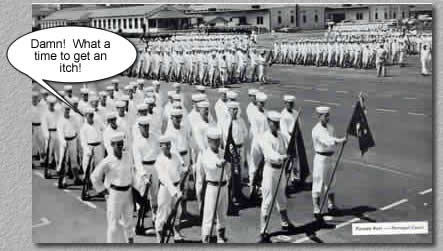
I
signed up for sea duty . . . .
I
did
well on all my basic battery tests. I had originally wanted to be
an Aviation Machinist mate or Machinery Repairman. Well, they said
all those quotas were full. So instead of offering me some other
school, they said I could make up my mind later on (yea right) and
shipped me out. I wanted to get on a ship and see the world, but
instead I got shore duty at the Pacific Reserve Fleet in Stockton,
CA. I thought this was a sea-going navy, what the hell was the Navy
doing in-land in Stockton, CA!
Navy
publicity arrival photo. This sure is not the way I arrived!
Discarding
our old civies. Most of us were suckered into donating them to charity.
Our
new mailing address. Sheesh, will you look at that zip code!
Filling
our seabag - with our first set of mothball smelling uniforms.
Inventorying
our new seabag. Now, don't those new hats fit good?!
Taking
our basic battery tests - early in the morning, on very little sleep,
I might add.
Camp
Nimitz, our home for the first 3-1/2 weeks. And, this 3-1/2 weeks
didn't count towards the "recruiter promised" 9-week duration!
The arrow indicates my barracks.
Evening
routine - washing our uniforms with scrub brushes with bristles
so stiff that our uniforms were almost worn out before we got out
of Boot Camp!
Guarding
our wash. Okay, from what?
Morning
physical fitness exercises - I still get tired just looking at this
photo!
Entering
the gas chamber with gas masks on. While inside, they had us remove
our masks, with the chamber full of tear gas. Now I understand why
the bad guys give up after experiencing that stuff! It's nasty!
Boat
drills - learning teamwork and seamanship.
Learning
fire fighting - not to mention, getting all sooty.
Qualifying
at the Camp Elliott Firing Range. Now, this day was fun!
Chow
time! Uuummmm! Mystery meat, 20-yr old canned yams, suck-all-the-mosture-outta-your-mouth
lima beans, and huh? Only one pat of butter for two slices of bread?
Can I have another helping, please? What's for dessert?
Bag
inspection for company 62-185.
Company
62-185 drilling - what else is new!
Company
62-185 marching, and marching, and marching, . . . .
Company
62-185 Petty Officers - note that I wasn't one of them. You're not
going to label me a rate grabber!
Company
62-185 passing in review. The good thing about this is that it means
that boot camp is almost over!!
Departure
for leave & next duty station. What the hell is that expression
on my face all about? I should be grinning, after all I was leaving
the place!

Seaman
Apprentice
History
Of Recruit Training Center
San Diego, CA
The
Naval Training Center, San Diego, began construction on 135
acres of highland and 142 acres of tideland, donated by the
City of San Diego, in 1921. On 1 June 1923, the U.S. Naval
Training Station, San Diego, was placed in commission under
the command of Captain (later Rear Admiral) David F. Sellers,
U.S. Navy.
At
the time of its commissioning in 1923 the station bore little
resemblance to its size or arrangement during my training
period in 1962. At that time Camp Paul Jones housed the entire
population of the station and the maximum recruit strength
was 1,500. The period of recruit training was then sixteen
weeks. The shore line of San Diego Bay extended considerably
further inland than at present, and the land now occupied
by Preble Field, the North Athletic Area and Camp Farragut
was entirely underwater. The recruit parade ground was located
on the present site of the Public Works garage. During the
1920's the Recruit Receiving and Outgoing Units were housed
in the Detention Unit, known as Camp Ingram, which consisted
of a group of walled tents adjacent to the south boundary
of Camp Paul Jones. Until Camp Lawrence was completed in 1936,
recruits spent their first three weeks of training under canvas
in this Detention Unit.
In
1939 a construction program was commenced which within three
years was to increase the capacity of the station four-fold.
This expansion went hand in glove with a large scale program
of harbor improvements by means of of which the channel and
anchorages in San Diego bay were deepened and 130 acres of
filled land were added to the eastern boundaries of the station.
By 1941 Camp Luce had been completed, and the construction
of Camps Mahan, Decatur, and Farragut was already well under
way when the Japanese attacked Pearl Harbor. Virtually all
this construction work was completed by September, 1942, when
the capacity of the station had reached its wartime peak of
33,000 men, 25,000 of whom were recruits. The period of recruit
training during World War II varied between three weeks and
seven weeks.
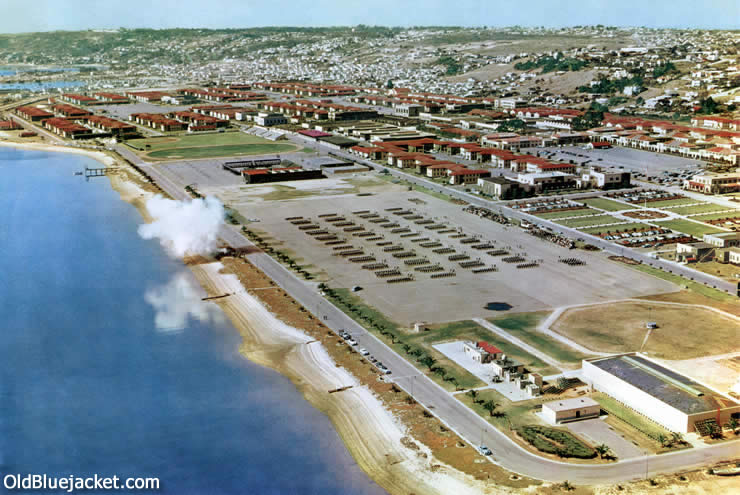 NTC San Diego, Ca - Photo Courtesy of Donald Artherhults
NTC San Diego, Ca - Photo Courtesy of Donald Artherhults
In
April, 1944, the Secretary of the Navy changed the status
of the Training Station to that of a group command and redesignated
it the U.S. Naval Training Center, San Diego. Under the Center
Commander were established three subordinate commands: The
Recruit Training Command, The Service School Command, and
the Administrative Command.
The
years immediately following World War II saw a considerable
reduction in population of the Training Center despite a post-war
expansion of the Service Schools, and by the end of 1949 the
population of the Center had dropped to a twenty year low
of 5,800 men. Six months later, when the Communists invaded
the Republic of Korea, an immediate expansion of all Naval
training activities took place and by September of 1950 the
Center was again operating at nearly full capacity.
During
the early months of the Korean conflict it became apparent
that the demand for trained personnel in the rapidly growing
Pacific Fleet would require further expansion of this training
center. Accordingly steps were taken by the Navy Department
to reactivate Camp Elliott, formerly a World War II Marine
Corps training camp which is located ten miles north of San
Diego on Kearny Mesa. On 15 January 2023 Camp Elliott was
placed in commission as Elliott Annex of the Naval Training
Center for the purpose of conducting the primary phases of
recruit training. In March 1953, in line with the planned
reduction in size of the Navy, training at Elliott Annex was
discontinued and it was placed in an inactive status. During
its two years of operation, over 150,000 recruits received
training there.
Late
in 1952 projects were approved to convert some recruit barracks
into classrooms and to extend training facilities by construction
of a permanent recruit camp on the undeveloped Training Center
land lying to the south and east of the estuary. The six converted
barracks went into service as recruit classrooms in April,
1953, and construction work on the new camp was completed
in 1955. With the completion of this project the Naval Training
Center filled out to its present boundaries of 435 acres.
The
largest of the three commands at the Training Center is the
Recruit Training Command. Here the recruit undergoes his transition
from civilian to military life; learns the history, traditions,
customs and regulations of his chosen service; and receives
instruction in naval skills and subjects which will be basic
information throughout his period of naval service. Most
of the facilities of the Recruit Training Command are centered
on Bainbridge Court and occupy the western half of the Training
Center. Here are concentrated the barracks and headquarters
of the recruit brigade, and nearby are located the mess halls,
classrooms, athletic fields and recreation buildings used by
the recruits.
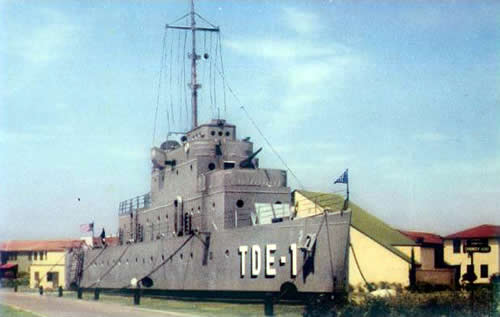
USS
Recruit TDE-1
It
was the first of its kind -- not quite 'building, not
quite a ship. USS Recruit (TDE-1 and TFFG-1) the Navy's
first non-ship, was originally a commissioned vessel
and observed traditional Naval shipboard procedures
like all other vessels. Any Sailor who ever served duty
on board this haze gray ship awash in concrete, fondly
remembers his first 'request permission to come aboard.
Affectionately
known as USS Neversail, the Recruit was a two-thirds
scale mock-up and served as a Sea Daddy to new recruits.
When completed in 1949, it was 225 long, had a 24-foot,
four inch beam and a 41-foot mast.
During
construction, Sailors in NTC's seamanship division supervised
the rigging with standard Navy fittings obtained from
salvage and mothballed ships. The Recruit was commissioned
Rear Adm. Wilder D. Baker, commandant, Eleventh Naval
District, on July 27, 1'949. A commission pennant was
broken and the ensign and Union Jack was hoisted.
It
served as a school for all recruits going through basic
seamanship indoctrination. The ship's deck was an exact
replica of what a Sailor could expect in the fleet.
The Recruit had cleats, chocks nd mooring lines and
operated as any standard Navy ship. Sailors learned
rnarlinspike seamanship, ground tackle operation, cargo
booms, deck fittings, lift boat handling and signal
equipment.
Besides
the regular classrooms, a company of recruits would
stay on board from 8 p.m. to 8 a.m. each night to polish
watchstanding skills.
|

Please Sign My Guest Book
|